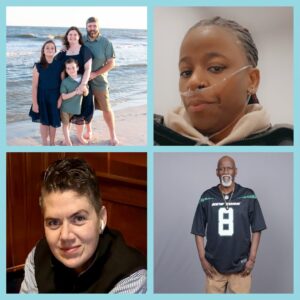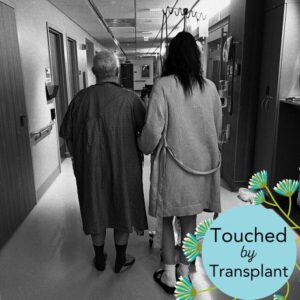Rick Brittell was diagnosed with congestive heart failure in 2011. In April 2014, Rick and his wife, Susie, moved from their home in Boise, Idaho to a trailer in Salt Lake City, Utah for 2 ½ months so that Rick could receive a left ventricular assist device (LVAD) as a bridge to a heart transplant—his only option for a healthy life. Rick and Susie returned home to Boise but left their home once again in April 2015 to move into a Salt Lake City apartment. Rick received his transplant in September 2015. Rick and Susie will finally be able to return home in March 2016 after a full year spent away from home. They have been fundraising with HelpHOPELive since January 2015.

Rick and Susie Brittell.
Why did you make the decision to wait before getting Rick listed for a transplant?
Rick: I could have been listed for transplant right after I received the LVAD but I chose to wait until April 2015 when my Medicare took effect. Had I proceeded right away with being listed, the procedure would have been covered but not the post-transplant medications, leaving me to cover $7,000 to $14,000 out-of-pocket each month. Once Medicare took effect, the surgery and the medications were both covered and the post-transplant monthly medication costs dropped to $400 to $600 per month.
Once listed, multiple factors influence how long a candidate waits for a transplant, including the candidate’s health and the number of organs available in a particular region. According to the United Network for Organ Sharing, “you may receive an organ that day, or you may wait many years.”

Rick lived with an LVAD until his transplant.
How did you feel when you found out you would have to relocate?
Rick: It was a shocker. When we skyped with our 3-year-old grandson, he would ask, ‘Why did you leave me?’ I couldn’t even talk to him because it tore me up. We were suddenly cut off from our family and friends and we had to make a whole new life for ourselves.
Transplant candidates must be able to leave home and come to a specific medical facility as soon as they receive word from their medical team that an organ is available. That’s why some candidates are asked to relocate close to that medical facility while they wait for “the call.”
How has the waiting process affected you emotionally?
Rick: I couldn’t drive for 2 years after I got the LVAD. I became completely dependent on my wife to take me everywhere for everything from a medical appointment to a simple trip to the store. After 40 years of employment, I had to stop working cold turkey. I had to deal with feelings of guilt and worthlessness associated with that. My freedoms were being taken away.
Susie: It was a sobering experience to discover who our true friends were and how our family would support us. We had to learn to do it on our own and figure out how to make it work with little support.
Rick: It’s stressful, but we have chosen not to hold onto animosity. But now when I tell someone, ‘I’ll be there for you,’ I take it very seriously.
The average wait time to receive a heart transplant is six months to one year. A transplant candidate can be removed from the waiting list if his or her health significantly improves or deteriorates.

Support groups helped Rick and Susie find solace and community.
What advice would you give to another family waiting for a transplant?
Rick: Talk to someone who has gone through it. Learn about the procedure, the medications you’ll be taking and the side effects, and prepare for them. Don’t think that life will be perfect after the transplant. My body was torn up for weeks as I adjusted to the medication, and I pushed people away from me and felt mentally foggy. When you get that call, you will go from sky-high feeling lucky to get a heart to rock-bottom feeling guilty, sad or angry that someone had to pass away for you to get the transplant. You will swing back and forth, but you WILL level out again.

Rick after his lifesaving transplant.
Susie: Do not think that you can shoulder the burden alone. As a caregiver, be patient and know that the person you love might get belligerent, angry or moody, but that is not the same person you love. The person you love will be back after a while. Find someone to unload onto so you don’t take out your frustrations on your loved one.
72 percent of American adults experience financial stress at least some of the time, and 26 percent experience financial stress most or all of the time. Start fundraising for a transplant as soon as possible to reduce the amount of financial stress you’ll have to deal with as you prepare for transplant.
What is life like after transplant?
Susie: I’m just so glad the waiting part is over. We are different people from when we first left for Salt Lake City. It has made us less self-absorbed and has opened our eyes to how narrow-minded you can become.
Rick: Hot dog, I’ve got a new lease on life now. I can look forward to seeing my family and my grandkids again. Before the LVAD, I could walk about 50 feet per day on oxygen before I was exhausted. Now I can walk 2 to 3 miles. I have realized that I can do this, and I see the light at the end of the tunnel. The journey is not over but there’s a lot more hope than there used to be.
Rick and Susie continue to fundraise with HelpHOPELive for post-transplant expenses including relocation, medical appointment co-pays and a lifetime of immunosuppressants.
Rick Brittell was diagnosed with congestive heart failure in 2011. In April 2014, Rick and his wife, Susie, moved from their home in Boise, Idaho to a trailer in Salt Lake City, Utah for 2 ½ months so that Rick could receive a left ventricular assist device (LVAD) as a bridge to a heart transplant—his only option for a healthy life. Rick and Susie returned home to Boise but left their home once again in April 2015 to move into a Salt Lake City apartment. Rick received his transplant in September 2015. Rick and Susie will finally be able to return home in March 2016 after a full year spent away from home. They have been fundraising with HelpHOPELive since January 2015.

Why did you make the decision to wait before getting Rick listed for a transplant?
Rick: I could have been listed for transplant right after I received the LVAD but I chose to wait until April 2015 when my Medicare took effect. Had I proceeded right away with being listed, the procedure would have been covered but not the post-transplant medications, leaving me to cover $7,000 to $14,000 out-of-pocket each month. Once Medicare took effect, the surgery and the medications were both covered and the post-transplant monthly medication costs dropped to $400 to $600 per month.
Once listed, multiple factors influence how long a candidate waits for a transplant, including the candidate’s health and the number of organs available in a particular region. According to the United Network for Organ Sharing, “you may receive an organ that day, or you may wait many years.”

How did you feel when you found out you would have to relocate?
Rick: It was a shocker. When we skyped with our 3-year-old grandson, he would ask, ‘Why did you leave me?’ I couldn’t even talk to him because it tore me up. We were suddenly cut off from our family and friends and we had to make a whole new life for ourselves.
Transplant candidates must be able to leave home and come to a specific medical facility as soon as they receive word from their medical team that an organ is available. That’s why some candidates are asked to relocate close to that medical facility while they wait for “the call.”
How has the waiting process affected you emotionally?
Rick: I couldn’t drive for 2 years after I got the LVAD. I became completely dependent on my wife to take me everywhere for everything from a medical appointment to a simple trip to the store. After 40 years of employment, I had to stop working cold turkey. I had to deal with feelings of guilt and worthlessness associated with that. My freedoms were being taken away.
Susie: It was a sobering experience to discover who our true friends were and how our family would support us. We had to learn to do it on our own and figure out how to make it work with little support.
Rick: It’s stressful, but we have chosen not to hold onto animosity. But now when I tell someone, ‘I’ll be there for you,’ I take it very seriously.
The average wait time to receive a heart transplant is six months to one year. A transplant candidate can be removed from the waiting list if his or her health significantly improves or deteriorates.

What advice would you give to another family waiting for a transplant?
Rick: Talk to someone who has gone through it. Learn about the procedure, the medications you’ll be taking and the side effects, and prepare for them. Don’t think that life will be perfect after the transplant. My body was torn up for weeks as I adjusted to the medication, and I pushed people away from me and felt mentally foggy. When you get that call, you will go from sky-high feeling lucky to get a heart to rock-bottom feeling guilty, sad or angry that someone had to pass away for you to get the transplant. You will swing back and forth, but you WILL level out again.

Susie: Do not think that you can shoulder the burden alone. As a caregiver, be patient and know that the person you love might get belligerent, angry or moody, but that is not the same person you love. The person you love will be back after a while. Find someone to unload onto so you don’t take out your frustrations on your loved one.
72 percent of American adults experience financial stress at least some of the time, and 26 percent experience financial stress most or all of the time. Start fundraising for a transplant as soon as possible to reduce the amount of financial stress you’ll have to deal with as you prepare for transplant.
What is life like after transplant?
Susie: I’m just so glad the waiting part is over. We are different people from when we first left for Salt Lake City. It has made us less self-absorbed and has opened our eyes to how narrow-minded you can become.
Rick: Hot dog, I’ve got a new lease on life now. I can look forward to seeing my family and my grandkids again. Before the LVAD, I could walk about 50 feet per day on oxygen before I was exhausted. Now I can walk 2 to 3 miles. I have realized that I can do this, and I see the light at the end of the tunnel. The journey is not over but there’s a lot more hope than there used to be.
Rick and Susie continue to fundraise with HelpHOPELive for post-transplant expenses including relocation, medical appointment co-pays and a lifetime of immunosuppressants.











